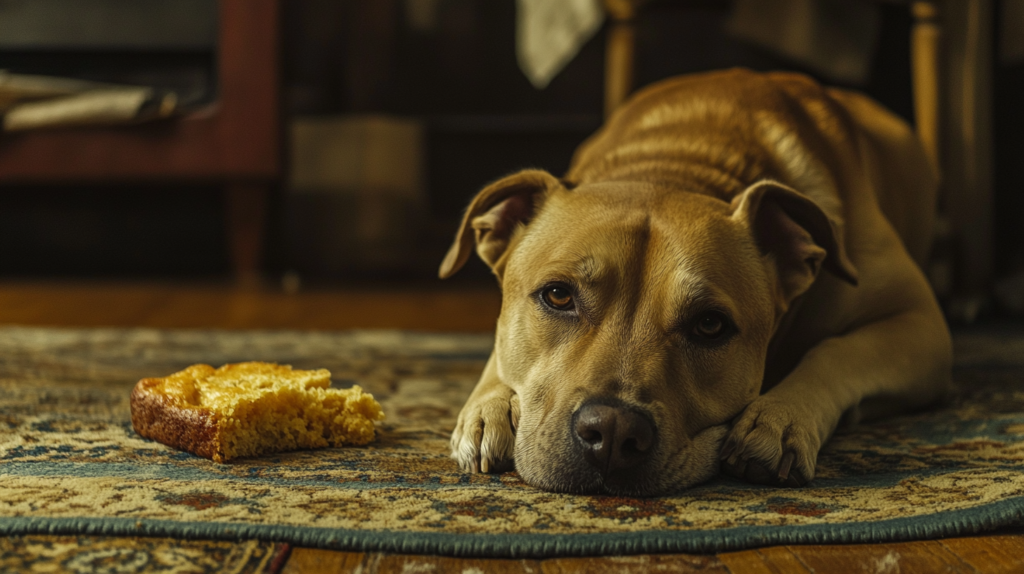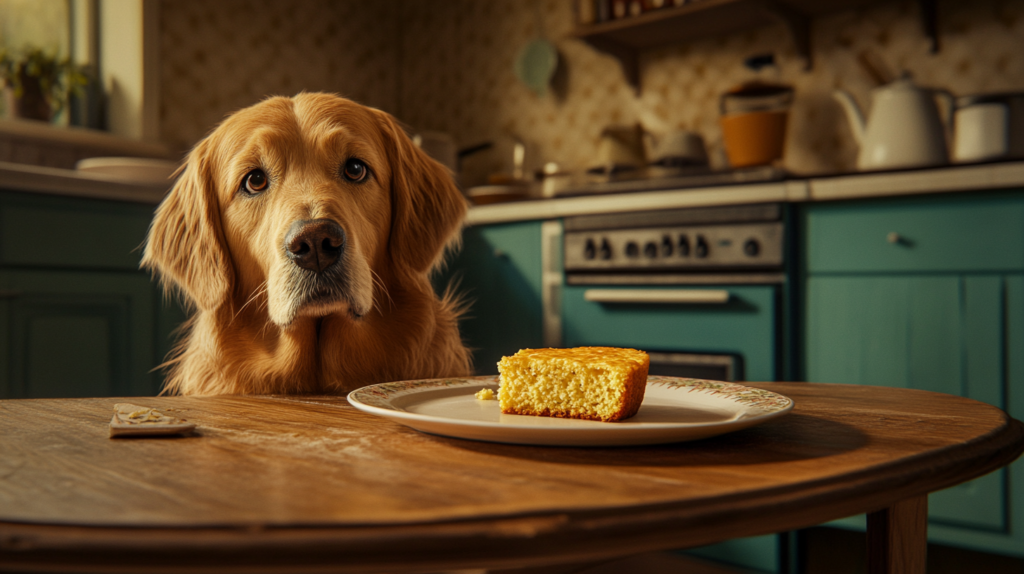Introduction
Dogs are more than just pets; they’re cherished members of the family. That’s why it’s natural for pet owners to want to share their meals and treats with their furry companions. Cornbread, a comforting and popular food, often makes its way to our plates. But is cornbread safe for dogs? The answer isn’t as straightforward as you might think.
While cornbread is made primarily from cornmeal, which is generally safe for dogs, its additional ingredients can vary significantly, making some recipes risky for canine consumption. In this article, we’ll explore whether dogs can eat cornbread, what ingredients are safe, the potential risks, and how to make dog-friendly cornbread recipes. By the end, you’ll have a clear understanding of when and how you can safely share cornbread with your dog.
Nutritional Value of Cornbread for Dogs
Cornbread is a simple yet flavorful dish that combines cornmeal with various ingredients like eggs, milk, sugar, and butter. While it’s a delightful treat for humans, many pet owners may wonder, can dogs eat cornbread safely? Its nutritional impact on dogs is not identical to humans, and to understand whether it’s safe for dogs, let’s break down its components.
Ingredients Safe for Dogs
Some ingredients in cornbread are generally harmless to dogs when consumed in moderation.
- Cornmeal:
The primary ingredient in cornbread, cornmeal is a ground version of dried corn. It’s a rich source of carbohydrates, providing energy for dogs. However, it lacks substantial protein, fiber, and other vital nutrients, so it’s not a complete food for dogs. - Eggs:
Eggs are often included in cornbread recipes and are an excellent source of protein and essential amino acids. Eggs are generally safe for dogs and can contribute to a shinier coat and better muscle health. - Milk:
Milk or dairy products in cornbread are typically okay for dogs in small amounts, but they can cause digestive upset in dogs that are lactose intolerant. Always observe your dog’s tolerance to dairy before sharing cornbread. - Oils:
Cornbread is often made with oils or fats like vegetable or canola oil. While these fats are not toxic, overconsumption can lead to weight gain or upset stomachs in dogs.
Ingredients Harmful for Dogs
Not all cornbread ingredients are dog-friendly. Many traditional recipes include additives that can be dangerous for your furry friend.
- Sugar:
Sweet cornbread contains sugar, which dogs don’t need in their diet. Excess sugar can lead to obesity, diabetes, and dental problems in dogs. - Salt:
High levels of salt are unhealthy for dogs and can cause dehydration, increased thirst, and even sodium poisoning if consumed in large amounts. - Butter:
Butter is high in fat and can contribute to pancreatitis in dogs when eaten in large amounts. - Artificial Additives:
Many pre-packaged or store-bought cornbreads may contain preservatives, artificial flavors, or sweeteners like xylitol, which is highly toxic to dogs and can cause severe health issues.
Potential Benefits When Dogs Eat Cornbread
While not an essential part of a dog’s diet, many pet owners wonder if dogs can eat cornbread safely. Cornbread can offer some benefits if prepared appropriately and given sparingly, ensuring it doesn’t disrupt their regular nutrition.
Digestibility and Energy
Cornmeal, the base of cornbread, is a carbohydrate source that can provide a quick energy boost for active dogs. However, dogs process carbs differently than humans, and excessive carb intake may not align with their dietary needs, which are primarily protein-based.
Fiber and Stomach Health
Cornmeal does contain a small amount of dietary fiber, which can help regulate digestion in dogs. A small amount of plain cornbread might benefit dogs with occasional digestive issues. However, too much cornbread can lead to bloating, gas, or diarrhea.
Risks When Dogs Eat Cornbread

While cornbread might seem like a harmless snack, there are several potential risks associated with feeding it to dogs. These risks often depend on the recipe and the portion size. Understanding these dangers can help you make informed decisions about offering cornbread to your furry companion.
Upset Stomach and Digestive Issues
Cornbread can sometimes lead to stomach upset in dogs, especially if it contains ingredients like butter, sugar, or milk. Signs of digestive discomfort may include:
- Vomiting
- Diarrhea
- Bloating
- Gas
Dogs that are lactose intolerant may struggle to digest the milk or butter in cornbread, resulting in gastrointestinal distress. Similarly, excessive fat from butter or oil can cause pancreatitis, a serious condition that requires immediate veterinary care.
Allergic Reactions
Some dogs are allergic to specific ingredients found in cornbread, particularly corn. Corn allergies in dogs are uncommon but possible. Symptoms of an allergic reaction may include:
- Itchy skin
- Red or inflamed patches
- Excessive licking or scratching
- Ear infections
- Gastrointestinal issues
If your dog shows any of these symptoms after eating cornbread, consult a veterinarian promptly.
Obesity Risks
Cornbread is calorie-dense due to its high carbohydrate and fat content. Regularly feeding cornbread to your dog can contribute to weight gain, particularly in sedentary or older dogs. Obesity in dogs can lead to various health issues, such as:
- Joint problems
- Diabetes
- Heart disease
It’s important to consider your dog’s overall diet and activity level before offering calorie-rich treats like cornbread.
Portion Control for Dogs
Even if the cornbread is free from harmful ingredients, portion size is critical. Dogs have smaller caloric needs than humans, so even small portions of human food can quickly add up. A bite-sized piece of plain cornbread as an occasional treat is generally safe, but offering larger portions can upset their balanced diet.
Safe Cornbread Recipes for Dogs to Eat

If you’d like to share cornbread with your dog, you might wonder, can dogs eat cornbread safely? Homemade recipes are the safest option, as they allow you to control the ingredients and avoid potentially harmful additives.
Homemade Cornbread Recipe
Creating dog-friendly cornbread at home is simple and ensures your furry friend gets a safe, enjoyable treat. Here’s a quick recipe:
Ingredients:
- 1 cup cornmeal
- 1/2 cup whole wheat flour
- 1 egg
- 1/2 cup unsweetened applesauce (optional for flavor)
- 1/2 cup water or unsalted chicken broth
Instructions:
- Preheat your oven to 350°F (175°C).
- Mix the cornmeal and whole wheat flour in a bowl.
- Add the egg, applesauce, and water, and stir until well combined.
- Pour the mixture into a greased baking dish or muffin tin.
- Bake for 20–25 minutes or until firm.
- Let it cool completely before serving small pieces to your dog.
This recipe avoids sugar, salt, and butter, making it a healthier option for your dog.
Modifying Store-Bought Cornbread
If you don’t have time to make cornbread from scratch, modifying store-bought mixes can be an alternative. However, you must carefully read the ingredient list and avoid harmful additives. Here’s how to make store-bought cornbread safer for dogs:
- Choose Unsweetened Mixes: Select a mix without added sugars or artificial sweeteners like xylitol.
- Skip Harmful Additions: Avoid adding butter, milk, or other ingredients that might upset your dog’s stomach. Instead, use water or unsalted chicken broth for moisture.
- Limit Seasonings: Do not add spices, herbs, or other flavorings, as some can be toxic to dogs.
- Use Small Portions: Prepare the mix in small muffin tins to create bite-sized portions that are easier to manage and control.
This approach ensures your dog can enjoy a treat without compromising their health.
Frequently Asked Questions
It’s common for pet owners to have lingering questions about whether cornbread is suitable for their furry friends. Here are some frequently asked questions to clarify your concerns.
Can Puppies Eat Cornbread?
Puppies have more sensitive digestive systems than adult dogs, so they should be fed carefully. While plain cornbread without harmful ingredients may be safe in tiny amounts, it’s best to prioritize a balanced puppy diet. Overloading a puppy with treats like cornbread can lead to digestive issues or interfere with their growth and nutrition.
Should Cornbread Be a Regular Part of a Dog’s Diet?
Cornbread should not be a staple in a dog’s diet. While it can be a fun, occasional treat, dogs require diets high in protein and healthy fats. Cornbread is primarily a source of carbohydrates, which are less critical to a dog’s nutritional needs. Feeding cornbread too often can lead to weight gain and an unbalanced diet.
What Should I Do If My Dog Accidentally Eats Sweet Cornbread?
If your dog consumes sweet cornbread, monitor them closely for signs of an upset stomach, allergic reactions, or symptoms of xylitol poisoning. Symptoms of xylitol poisoning include:
- Vomiting
- Weakness
- Loss of coordination
- Seizures
If you suspect xylitol or any harmful ingredient was ingested, contact your veterinarian immediately. For more dog-safe treat options, explore healthy homemade ideas like peach crumble recipes that can be tailored to exclude harmful ingredients.
Can Cornmeal Cause Allergies in Dogs?
Cornmeal is generally safe for most dogs, but some may have sensitivities or allergies. Symptoms of a corn allergy include itching, gastrointestinal distress, and ear infections. If your dog has a history of food allergies, consult your vet before introducing cornbread or cornmeal into their diet. For ideas on managing allergies in dog treats, consider recipes using alternative ingredients like rockfish.
Is Gluten-Free Cornbread Better for Dogs?
Gluten-free cornbread may be a better option for dogs with gluten sensitivities or allergies. Always check the ingredient list to ensure the mix doesn’t contain harmful additives like sugar or artificial sweeteners. Gluten-free options are safe for most dogs as long as other ingredients align with their dietary needs. Want to explore more healthy diets for pets? Read about what makes rotisserie chicken safe for dogs.
How Can I Make Cornbread Healthier for My Dog?
To make cornbread healthier for your dog, prioritize these guidelines:
- Use whole-grain cornmeal for added fiber.
- Replace butter or oil with unsweetened applesauce or pumpkin puree.
- Avoid sugar, salt, and other unnecessary ingredients.
- Cut the cornbread into small, manageable pieces to control portions.
Feeding Cornbread to Dogs: Final Considerations
While cornbread can be offered as an occasional treat, it’s essential to address the question, can dogs eat cornbread without risks? There are several important considerations to ensure your dog’s safety and health, including monitoring your dog’s response, understanding individual dietary needs, and prioritizing balance in their overall diet.
Observing Your Dog’s Reaction to Cornbread
When introducing cornbread to your dog for the first time, it’s important to observe how they react to the new food. Here are some tips:
- Start with a Small Portion: Offer your dog a tiny piece of plain cornbread and monitor for any immediate reactions, such as changes in energy levels or visible discomfort.
- Watch for Allergic Symptoms: Check for signs of itching, redness, or digestive upset in the hours following consumption.
- Monitor Long-Term Effects: Even if there are no immediate adverse effects, keep an eye on your dog’s weight and overall health if cornbread becomes a recurring treat.
Matching Cornbread to Your Dog’s Dietary Needs
Not all dogs have the same dietary requirements. Factors such as age, breed, activity level, and health status can influence whether cornbread is a suitable treat. For example:
- Active Dogs: Dogs with high activity levels may tolerate the extra carbohydrates in cornbread better than sedentary pets.
- Overweight Dogs: Cornbread is calorie-dense and should be avoided for dogs prone to obesity.
- Senior Dogs: Older dogs may have more sensitive stomachs and benefit from a simpler, protein-rich diet.
Always consult your veterinarian before introducing new foods into your dog’s diet, especially if they have underlying health conditions like diabetes or allergies.
Balancing Treats with a Healthy Diet
Cornbread, like all treats, should only make up a small percentage of your dog’s overall caloric intake. The Association of American Feed Control Officials (AAFCO) recommends that treats and snacks comprise no more than 10% of a dog’s daily calories. This ensures your pet receives the majority of their nutrition from their regular, balanced dog food.
To achieve this balance:
- Limit treats to special occasions.
- Prioritize high-quality dog food as the primary source of nutrition.
- Use cornbread as a reward rather than a routine addition to meals.
When to Avoid Cornbread Altogether
In some cases, it’s best to avoid feeding cornbread to dogs entirely. Situations include:
- Known Allergies or Sensitivities: Dogs with a history of food allergies should not consume cornbread.
- Dietary Restrictions: Pets on a veterinarian-prescribed diet or weight management plan should avoid calorie-dense treats like cornbread.
- Pregnant or Nursing Dogs: Nutritional needs are heightened during pregnancy or nursing, and cornbread does not offer the essential nutrients required for these stages.
Common Alternatives to Cornbread for Dogs
If you’re looking for healthier or safer treat options, consider these alternatives:
- Plain Cooked Vegetables: Carrots, green beans, and sweet potatoes are low-calorie, nutritious options that dogs often enjoy.
- Dog-Specific Treats: Many commercially available treats are designed to meet a dog’s nutritional needs and come in a variety of flavors.
- Homemade Biscuits: Create simple dog treats using ingredients like oats, peanut butter (xylitol-free), and pumpkin puree.
Conclusion
Cornbread can be a delightful occasional treat for your dog, provided it’s prepared with their safety in mind. While the basic ingredients like cornmeal and eggs are generally safe, traditional recipes often include harmful additions like sugar, butter, and artificial additives. Homemade, dog-friendly cornbread is the best option for ensuring your furry friend enjoys a treat without compromising their health.
Keep in mind that moderation is key. Even the healthiest version of cornbread should only make up a small fraction of your dog’s overall diet. Always monitor your pet for any adverse reactions and consult your veterinarian before introducing new foods, especially if your dog has specific dietary needs or health conditions.
By taking these precautions, you can safely share the occasional cornbread treat with your canine companion, turning snack time into a happy and worry-free bonding moment.
If you’re considering other homemade treat options, explore ideas like the benefits of rotisserie chicken for dogs.
Printable Recipe Card
Want just the essential recipe details without scrolling through the article? Get our printable recipe card with just the ingredients and instructions.

